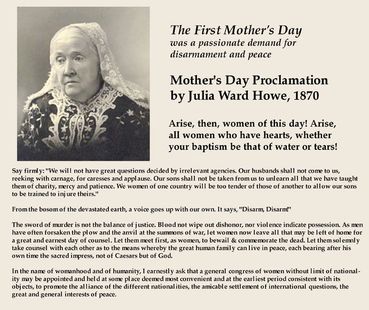
Of course, God is also neither male nor female. For the mystery of pure Love and Being can hardly be limited to any human categories. Indeed, at the beginning and end of all things, God is beyond all our human comprehension. Even to say that God is pure Love risks limiting that mystery to human understanding. Yet it is a wonderful way of summing up the ultimate source and womb of life, particularly on this Mothers Day, when we have the opportunity of celebrating so much of the human wombs and nurture of our lives. Such spiritual insights were at the heart of Mother Julian’s life and teaching, back in the middle ages. For Julian lived in a very troubled age, with war and disease and many major personal sufferings of her own. However, out of her life of deep prayer, she affirmed Love as at the heart of all things, and offered counsel and constant intercessory prayer for people of all kinds. Among other things, she was probably the first woman ever to write and be published in the English language. In the words of perhaps her most famous saying, she saw that, ultimately, ‘all shall be well, and all manner of things shall be well.’
Not for nothing is Julian therefore a guide to us today into the motherly love of God. For it isn’t it part of the essential gift of a true mother to provide their child with the deep down assurance that they are loved? Mothers come in all shapes and sizes, rich and poor, with all kinds of quirks and failings. No human mother is perfect. Yet aren’t mothers ultimately loved, and rightly loved, for the love they provide and nurture in us? In that sense, every mother can be what the early Church called Mary, the mother of Jesus: namely, a ‘God-bearer’, carrying and sharing aspects of the mothering love of God.
Julian gave us some striking language about God as Mother, including Jesus as Mother. In her age, she was also hardly alone in speaking of God and Jesus in that way. Drawing upon rich images of God as mother in the Bible, and on their living spiritual experience, many others did so too, including an Archbishop of Canterbury, the brilliant theologian Anselm. One of his canticles is in our Prayer Book, on pages 438 to 439. It is full of evocative images of a mother’s love:
Jesus, as a mother you gather your people to you:
You are gentle with us as a mother with her children;
Often you weep over our sins and our pride:
tenderly you draw us from hatred and judgement.
You comfort us in sorrow and bind up our wounds:
in sickness you nurse us,
and with pure milk you feed us.
Jesus, by your dying we are born to new life:
by your anguish and labour we come forth in joy.
Despair turns to hope through your sweet goodness:
through your gentleness we find comfort in fear.
Your warmth gives life to the dead:
your touch makes sinners righteous.
Lord Jesus, in your mercy heal us:
in your love and tenderness remake us.
In your compassion bring grace and forgiveness:
for the beauty of heaven may your love prepare us.
Isn’t that so beautiful and true? Yet, even in the 21st century, even after three waves of modern feminism, I wonder if we have truly grasped the renewing value of what Julian, Anselm and others in our Christian Bible and Tradition have taught us about God’s mothering love. Perhaps this Mothers Day we might reflect on this further, to deepen our awareness of, and participation in, the mystery of God? Make no mistake: this is not about jettisoning what is valuable in masculine images of God. Father, Lord, King, and so on: each image has its place. Yet we also need to know that God in Jesus is like a mother to us: that we are blood of God’s blood, human flesh of divine human flesh, offspring of God’s own womb; that our hearts beat because of God’s heartbeat; that we can always come back and rest in Jesus, full of tenderness, comfort and compassion; for, above all, God loved us before we were ever born, loves us now, and will always love us, come what may.
Do we truly know God in Jesus in that way? It makes all the difference to a living faith. For knowing God as the womb and constant strength of our lives relieves us of anxiety and empowers us for life. This is also the reality at the heart of the Week of Prayer for Christian Unity. For as our Gospel today reminds us, when we live in the love of God we know ourselves as one, despite all our differences. When we recognise that the love which was in Jesus is the same love which gave birth to us, nurtures and sustains us, we will naturally seek and find healing together. And, crucially, when we share in the mothering love of God, we will seek peace and harmony for everyone else as well. For ultimately, the beginnings and the present of Mothers Day are not separate from one another. Seeking peace for the world and care for particular persons are not opposing options. They are all part of God’s one mothering love for us all. After all, as all good feminists, as well as all good mystics tell us, the personal and the political – and, we may add, the prayerful - are one. So may God bless all mothers, all of us, and all who need and bear God’s love today, in Jesus’ name, Amen.
by Jon Inkpin, for Mothers Day/feast of St Julian of Norwich/beginning of the Week of Prayer for Christian Unity, Sunday after Ascension, Year C, 8 May 2016
 RSS Feed
RSS Feed